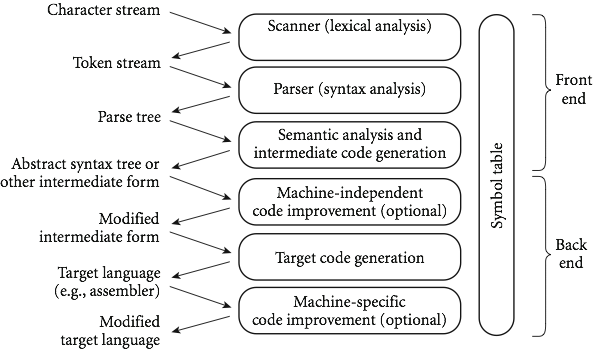Difference between revisions of "Multi-Paradigm Programming and Scripting"
Adelo Vieira (talk | contribs) (→Languages evaluation Criteria) |
Adelo Vieira (talk | contribs) (→Languages evaluation Criteria) |
||
| Line 65: | Line 65: | ||
|- style="vertical-align:top;" | |- style="vertical-align:top;" | ||
| | | | ||
| − | + | This refers to the ease with which programs (in the language under consideration) can be understood. This is especially important for software maintenance. | |
| − | + | *Simplicity: | |
| − | + | *Orthogonality: | |
| − | + | *Data Types: | |
| − | + | *Syntax Design: | |
| | | | ||
| − | + | This is a measure of how easily a language can be used to develop programs for a chosen problem domain. | |
| − | + | *Simplicity and Orthogonality: | |
| − | + | *Support for Abstraction: | |
| − | + | *Expressivity: | |
| | | | ||
| − | + | This is the property of performing to specifications under all conditions. | |
| − | + | *Type Checking: | |
| − | + | *Aliasing: | |
| | | | ||
| − | + | The following contribute to the cost of using a particular language: | |
| − | + | *Training programmers: cost is a function of simplicity of language | |
| − | + | *Writing and maintaining programs: cost is a function of readability and writability. | |
| − | + | *Compiling programs: for very large systems, this can take a significant amount of time. | |
| − | + | *Executing programs: Having to do type checking and/or index-boundary checking at run-time is expensive. There is a tradeoff between this item and the previous one (compilation cost), because optimizing compilers take more time to work but yield programs that run more quickly. | |
| − | + | *Language Implementation System: e.g., Java is free, Ada not | |
| − | + | *Lack of reliability: software failure could be expensive (e.g., loss of business, liability issues) | |
| | | | ||
| − | + | *Portability: the ease with which programs that work on one platform can be modified to work on another. This is strongly influenced by to what degree a language is standardized. | |
| − | + | *Generality: Applicability to a wide range of applications. | |
| − | + | *Well-definedness: Completeness and precision of the language's official definition. | |
|} | |} | ||
Revision as of 18:45, 2 November 2019
| Why Multi-Paradigm Programming and Scripting? | |||
|---|---|---|---|
| |||
| Content of this course | |||
Programming Constructs:
|
Programming Paradigms & Languages:
|
Scripting:
|
Applications of Shell Scripting:
|
Contents
Languages evaluation Criteria
https://www.cs.scranton.edu/~mccloske/courses/cmps344/sebesta_chap1.html
| Readability | Writability | Reliability | Cost | Other criteria |
|---|---|---|---|---|
|
This refers to the ease with which programs (in the language under consideration) can be understood. This is especially important for software maintenance.
|
This is a measure of how easily a language can be used to develop programs for a chosen problem domain.
|
This is the property of performing to specifications under all conditions.
|
The following contribute to the cost of using a particular language:
|
|
Compilation vs Interpretation
Object-Oriented Paradigm
C++ Inheritance
https://www.w3schools.com/cpp/cpp_inheritance.asp
https://www.tutorialspoint.com/cplusplus/cpp_interfaces.htm
Difference Between Static and Dynamic Binding
https://techdifferences.com/difference-between-static-and-dynamic-binding.html
Reflection
A programming language that supports reflection allows its programs to have runtime access to their types and structure and to be able to dynamically modify their behavior
- The types and structure of a program are called
metadata
- The process of a program examining its metadata is called
introspection
- Interceding in the execution of a program is called
intercession
Uses of reflection for software tools:
- Class browsers need to enumerate the classes of a program
- Visual IDEs use type information to assist the developer in building type correct code
- Debuggers need to examine private fields and methods of classes
- Test systems need to know all of the methods of a class
Downsides of Reflection:
- Performance costs
- Exposes private fields and methods
- Voids the advantages of early type checking
- Some reflection code may not run under a security manager, making code nonportable
Reflection in Java
- Limited support from
java.lang.Class
- Java runtime instantiates an instance of
Classfor each object in the program
- The
getClassmethod ofClassreturns theClassobject of an object
float[] totals = new float[100];Class fltlist = totals.getClass();Class stg = "hello".getClass();
- If there is no object, use class field:
Class stg = String.class;
- Class has four useful methods:
getMethodsearches for a specific public method of a classgetMethodsreturns an array of all public methods of a classgetDeclaredMethodsearches for a specific method of a classgetDeclaredMethodsreturns an array of all methods of a class- The
Methodclass defines the invoke method, which is used to execute the method found bygetMethod
Some tutorials
Examples from Introduction to Programming Using Python 3
http://www.cs.armstrong.edu/liang/py/ExampleByChapters.html
C++ tutorial
http://www.cplusplus.com/doc/tutorial/program_structure/
